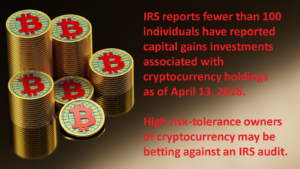Who Owns Bitcoin? Ask the IRS. They Have the List!
The IRS knows who owns bitcoin. Since before 2015, they’ve been checking the list and collecting red flags, and chances are good they’re now humming to the tune of It’s Beginning to Look a Lot Like Christmas.
Update Information
4-15-2018
The IRS reported that as of 4-13-2018, fewer than 100 individuals had reported capital gains investments associated with cryptocurrency holdings. High risk-tolerance to begin with, these individuals may be betting again an IRS audit, or it could be that they’re waiting until the last minute to file as they wait for more information from the IRS before filing.
Who should worry about the IRS? Anyone who owns bitcoin, that’s who.
Some owners are looking to the IRS to announce a policy of amnesty for bitcoin owners who failed to report their gains and earnings on past tax filings. Amnesty or Audit? Who knows? But here are some things that should concern you right now if you own bitcoin or any type of virtual or cryptocurrency:
IRS and Coinbase duke it out with the win going to the IRS. Owners of bitcoin didn’t seem to have helped their own cause when the IRS used as their argument that “…some users of cryptocurrency have openly acknowledged they consider using bitcoin in order to avoid tax reporting requirements. Forbes
The August Bitcoin Cash “air drop” hit everyone who owns bitcoin on the head. You might wonder what happens when free money like this unexpectedly appears. It may seem like magic, but the IRS saw it happen, and knows it was briefly worth as much as $2,500 per unit. So, how’s this taxed? Options range from corporate dividend, taxed at lower rates, or as ordinary income, or possibly as a share split which would leave no one owing anything. Fortune
Coinbase “won” when the court limited personal data requests by the IRS. As it stands, the IRS can request from Coinbase the taxpayer ID number, name, date of birth, address, transaction logs and account statements on accounts that have bought, sold, sent or received more than $20,000 in any of those types of transactions between 2013 and 2015. These users may or may not be limited to bitcoin owners, and may reach out to any cryptocurrency traders who meet the criteria. Techcrunch
Many cryptocurrency investors are using caution and keeping good records. Investors should treat these assents in the same manner as any other investment. Specifics include transacting from a wallet where you own the private keys. This ensures that every transaction you participate in is actually taking place on the blockchain. Investors relying on exchanges like Coinbase could be in for a rude awakening when they realize their transactions may not have actually taken place on the blockchain, but rather on the wallet provider’s company ledger. The Street
What does the IRS say about virtual currency?
On August 6, 2017, the IRS reviewed and updated its March 25, 2014 position by reaffirming that virtual currency is treated as property for U.S. federal tax purposes and that the General Rules for Property Transactions apply. IRS Notice 2014-12 offers current information regarding virtual currency. Below are some excerpts of interest:
“Virtual currency” may be used to pay for goods or services, or held for investment. Virtual currency is a digital representation of value that functions as a medium of exchange, a unit of account, and/or a store of value. In some environments, it operates like “real” currency — i.e., the coin and paper money of the United States or of any other country that is designated as legal tender, circulates, and is customarily used and accepted as a medium of exchange in the country of issuance — but it does not have legal tender status in any jurisdiction.
Virtual currency that has an equivalent value in real currency, or that acts as a substitute for real currency, is referred to as “convertible” virtual currency. Bitcoin is one example of a convertible virtual currency. Bitcoin can be digitally traded between users and can be purchased for, or exchanged into, U.S. dollars, Euros, and other real or virtual currencies.
In general, the sale or exchange of convertible virtual currency, or the use of convertible virtual currency to pay for goods or services in a real-world economy transaction, has tax consequences that may result in a tax liability.
Don’t count on the IRS turning a blind eye when they they see red flags waving. Remember, they have a list and they know who owns bitcoin.
What’s next?
The IRS Criminal Investigation Division has ordered training for its agents and have contracted with Chainanalysis for tracking, cointelegraph reported. Between 2013 and 2015, reportedly only 807 people have reported bitcoin to the IRS.
The IRS does, however, offer virtual currency owners the Offshore Voluntary Disclosure Programs to provide possible protection from criminal liability and offer some terms for resolving their civil tax and penalty obligations. For less serious offshore tax problems, the IRS offers their Streamlined program.
Now what?
If you’re not one of the 807 people who complied with IRS regulations pertaining to bitcoin and other cryptocurrency and virtual currency, you haven’t seen anything yet. If you think this is a long, complicated blog, wait until the IRS contacts you. You’ll really see complicated. Remember, when it comes to the IRS asking questions, tax filers are guilty until they’re able to prove they’re innocent.
We handle taxes every day, so does the IRS, and we’re both very good at it. BTW, the IRS doesn’t like going up against a CPA tax specialist. If the IRS must decide whether to audit a return prepared by a CPA, or one filed by a tax shop or DIYer, odds are very good they’ll leave the CPA return alone.
Bottom line.
Call 479.478.6831 or schedule an appointment using my Calendly Page (it’s easy!) or contact me by email melanie@radcliffcpa.com
QUICK TIP: Don’t wave red flags at the IRS. They’re still understaffed, overworked and can’t waste time on unprofitable audits! If they see your name on the list as a tax filer who owns bitcoin, and you’re not on the list 807, they see red flags and big money on the horizon.
The IRS puts the burden of value on the owner of virtual currency




